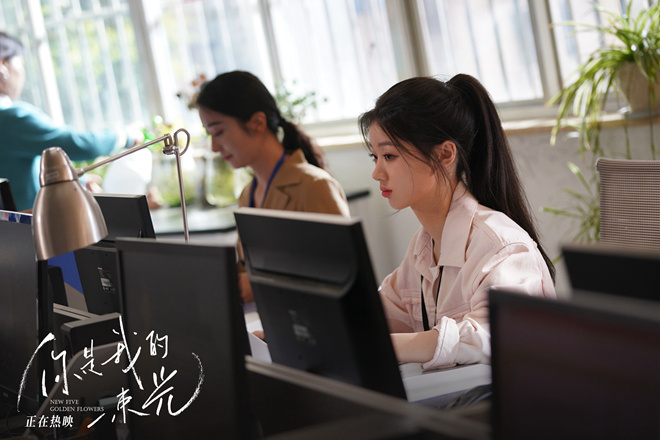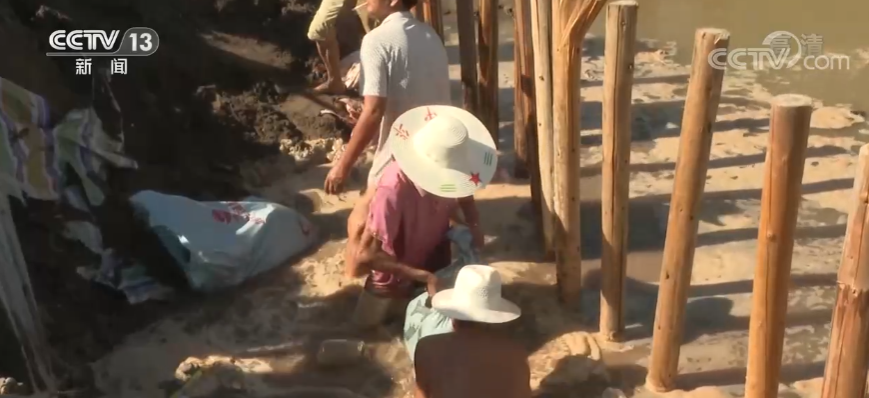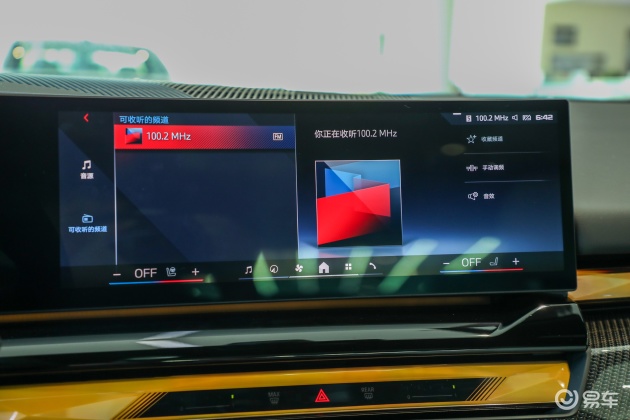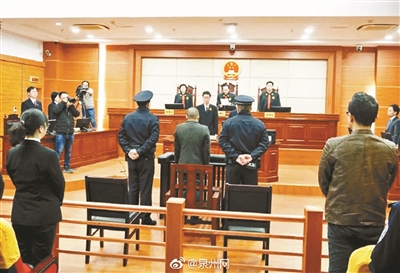The situation in the Middle East has suddenly escalated, and the United Nations is highly concerned.


















On July 7, the official WeChat account of the Information Center of Human Resources and Social Security Bureau of Huairen City, Shuozhou City, Shanxi Province issued a "statement of the situation" in response to "a netizen posted that an employee handling industrial injury insurance played with a mobile phone during working hours". It is understood that this matter was mistaken by the poster for playing with a mobile phone, and he did not restrain his emotions after being questioned, and had a dispute with the poster. Afterwards, the staff member apologized to the parties. In addition, the bureau informed and criticized the staff about the poor service attitude.
According to the short video official Weibo @ Green Hornet Bee of China Youth Network, the video shows that a woman with long hair is sitting in front of a computer and has a verbal conflict with another woman who claims to handle work-related injuries. "You complain hard and complain." The woman with long hair said that the other party can complain at will, and she didn’t come here to suffer indignities by taking 1,000 yuan a month.
The aforementioned "situation statement" stated that after the incident, the Huairen Municipal Bureau of Human Resources and Social Security conducted an investigation and handling.
It is understood that on the morning of July 6, the poster came to the industrial injury insurance center of the bureau to handle the industrial injury insurance business. Because the new system had just started to operate, the staff was communicating with engineers on some businesses through mobile phones at that time, and the poster mistakenly thought that the staff was playing with mobile phones. Later, under the questioning of the poster, the staff was not restrained enough and the service attitude was not good, and there was a dispute with the poster.
According to the "situation statement", after the incident, the bureau understood the whole incident process and sent the deputy director, the director of the industrial injury insurance center and the staff involved to the door. Through the communication with the poster’s parents, they sincerely apologized for the poor service attitude and gained understanding. The poster’s parents and I accepted the apology and gave understanding. At the same time, according to the requirements of the bureau party group, the industrial injury insurance center held a special meeting to inform and criticize the poor service attitude of the staff, and put forward the next treatment and rectification measures.
The Human Resources and Social Security Bureau of Huairen said that they would draw inferences from others, further strengthen the work style construction, further strengthen the education of purpose consciousness, and comprehensively promote the work of strictly administering the party. First, hold a meeting of cadres and workers to carry out discipline rectification and warning education; The second is to strengthen the professional quality training of staff and promote the theme education of "Do not forget your initiative mind, keep in mind the mission" in a normal way; Third, hold regular symposiums and solicit opinions, widely accept social supervision, and constantly improve the service level.

On January 17, 2023, consumers purchased new year’s goods in Yiwu fruit market, Zhejiang. Xinhua News Agency (photo by Gong Xianming)
Xinhua News Agency, Beijing, March 30th(Reporter Ding Yinghua, Zhou Rui, Wang Siyuan) Since the beginning of the year, with the optimization and adjustment of epidemic prevention and control policies and the successive introduction of steady growth policies, the streets and alleys of China have resumed their bustle, and the shopping malls have reappeared … … Foreign-funded enterprises in China have expressed full confidence in China’s strong economic recovery, and expect China to continue to be an important engine of Asia and even the world economy.
"Recently, we have observed that the traffic of offline and online stores has shown a strong upward trend, so we believe that consumers in China are regaining confidence and the market is accelerating recovery." Ma Rucheng, general manager of Ferriero China, the third largest chocolate candy manufacturer in the world, said.
This year, China will set the expected annual economic growth target at around 5%. At the 2023 annual meeting of China Development Forum held recently, Georgieva, managing director of the International Monetary Fund, pointed out that every 1% increase in China’s GDP will promote the economic growth of Asian countries by 0.3%.
For foreign companies, the development in China over the years has witnessed the strong "China Power" of the global economy.

On September 1, 2022, the audience visited the 2022 China International Fair for Trade in Services China Service Trade Achievement Exhibition Zone at the National Convention Center. Xinhua News Agency reporter Cai Yang photo
In the past 10 years, China’s average contribution rate to world economic growth has exceeded 30%; During the epidemic, the actual utilization of foreign capital in China increased from $144.4 billion in 2020 to $189.1 billion in 2022 … … A series of eye-catching data show that China, as the second largest economy in the world, continues to be an important engine for the recovery and development of the world economy and a highland for transnational investment.
Liu Maoshu, vice president of Honeywell Characteristic Materials and Technology Group and general manager of the Asia-Pacific region, said: "China plays an important role in the global operation of the company. China has been Honeywell’s second largest market and the largest growth market in the world for many years, and it is also one of the major R&D centers and manufacturing bases in the world."
He said that thanks to the comprehensive advantages of China’s complete industrial system, super-large-scale market, continuously optimized business environment and long-term positive economic fundamentals, Honeywell is full of confidence in its sustainable growth in China.
Ma Rucheng said that China has become and will continue to be Ferriero’s most important market in Asia. "For a multinational company like us, to succeed in Asia means to be the first in the China market."

On February 25th, at the container terminal of Qinzhou Port in Guangxi, unmanned vehicles were transferring containers. Xinhua News Agency reporter Zhang Ailin photo
Under the complicated situation that the world economy is facing multiple challenges, such as high inflation, weak demand and financial turmoil, many multinational companies are very optimistic about the long-term prospects of the China market and cast a "vote of confidence" for the China market with practical actions.
At the end of 2022, Honeywell announced that it would join hands with Zhejiang Jiaao Environmental Protection Technology Co., Ltd. to build a large-scale sustainable aviation fuel production base in Lingang Industrial Zone, Guanyun County, Lianyungang City, Jiangsu Province. Through this project, kitchen waste oil and animal fat can be transformed into sustainable aviation fuel. It is expected that the project will be completed in 2024, which will help China peak carbon dioxide emissions achieve the goal of carbon neutrality.
Talking about this investment, Liu Maoshu said that China’s prospects in the fields of digital economy and low-carbon development have brought broad development opportunities to Honeywell.
Ferriero, who has been deeply involved in China for more than 20 years, hopes to share the dividends in the China market through continuous investment. Statistics from the National Bureau of Statistics show that in the first two months of this year, the total retail sales of social consumer goods in China increased by 3.5% year-on-year, which turned from a decline to an increase, and the improvement and recovery of consumption became the highlight of economic operation.
Ma Rucheng said that China, Ferriero is ready to seize the great opportunity brought by the rebound of the China market. "Our goal is to double the turnover in the next three to five years."

1905 movie network news With Ying Dai, Wang Yixu and Zhang Yucheng as the chief producers, the official official lineup of "The Fox Demon Little Matchmaker Moon Red" starred by and. At the same time, the drama officially exposed a group of role posters for the first time. Tu Shan Red and Oriental Moon, played by the two men, are stunning in shape and beautiful in painting style. How will this ever-changing bondage between man and demon be opened? It is full of expectations.

Yang Mi’s Simon drama series is full of amazing modeling atmosphere and expectations.
In the series "The Fox Demon Little Matchmaker Moon Red", Yang Mi plays Tu Shan Honghong, a cold and domineering fox demon with a sense of righteousness, and Simon plays the Terran boy Oriental Yuechu, who is unrestrained but also helps the world. As one of the core chapters of the original "Fox Demon Little Matchmaker" animation, "Moon Red" has many famous scenes with sweet and abusive emotional settings that are extremely eye-catching and full of memories. The relationship and experience between the two people in the story further shows the emotional entanglement between man and demon, and continues the universal values of persistence, protection and love, or will bring a wonderful experience to the audience.
The casting of the play deserves special attention. Yang Mi, known as the "Little Fox", reveals a coolness in her exquisite appearance. Her aura eyes, together with the domineering fox demon style and exquisite eye makeup, directly fill up the strong and charming atmosphere. In the story, Tu Shan Red has a domineering royal elder sister and a soft and sensitive side. She is decisive and fair, extremely responsible, emotionally restrained and never released. If the person she values is in danger, Hong Hong will protect it at all costs. How Yang Mi will interpret the role this time is worthy of the audience’s expectation; At the beginning of Oriental Moon, Simon, an actor, brought his own sense of youth and clean temperament, and his performance was relaxed and delicate. This time, a black and white dress appeared, and the cool appearance poked the aesthetic preferences of many viewers. In the story, the Oriental Moon is pure-hearted, straightforward and heroic, and has an innate sense of justice. It seems to be unruly, but in fact it is very calm and mature at the critical moment, and its contrasting character is full of interesting points. As the first performance of two actors, the play is expected to collide with wonderful sparks under their tacit cooperation.

Ultra-high-temperature circle-breaking fermentation, sincere change, both content and innovation
The drama was not broadcast first, and once the official announcement information was exposed, it caused heated discussion inside and outside the industry, which set off a high discussion upsurge among netizens and fans. Among them, many related topics such as "Yang Mi Simon Fox Demon Little Matchmaker Moon Red", "Yang Mi Fox Demon Little Matchmaker Eye Makeup" and "Simon Oriental Moon Early" frequently triggered discussions in Weibo, and many netizens said that the style of the play was amazing! The two actors have a high degree of adaptability! " "It’s Tu Shan Red in my heart and the beginning of Oriental Moon. I look forward to broadcasting it soon."
It is reported that "Fox Demon Little Matchmaker Moon Red" is adapted from the popular "Fox Demon Little Matchmaker", which is an important chapter in the IP and has always attracted the attention of netizens. Looking at the film and television drama market in recent years, although it is not uncommon to change works, it is not the majority that can achieve the spread of breaking circles and capture audiences with high-quality content.

The IP expansion of "Fox Demon Little Matchmaker Moon Red", the behind-the-scenes team is bound to make great efforts in the presentation of the content, and assemble the ace team to create the oriental aesthetic story of China; Focus on high adaptation in casting, and join hands with a cast with both flow and strength. The drama highlights the highlights of the drama from the quality to the maximum interpretation, conveys the classic and universal value pursuit, and easily resonates with young people, which is bound to continue the explosion and further the road of domestic reform.

1905 movie network news Starring and starring, the film was officially released on February 25. The film was directed by the chief planner Zhang Heping and the screenwriter Liu Heng, and the film production team worked hard to create it. It tells the story of a retrograde person who uses his life to protect the masses. An extraordinary and heart-wrenching love story. Musician Mu Suixin (played by Yuan Wenkang), who is frustrated in the workplace and in love, drives to Yunnan and meets his single mother Peng Peng (played by Wang Xi). The relationship between the two gradually heats up. They discover the light on each other and touch the deepest secret wound in their hearts. The knot about Sun Yutong (played by Deng Chao) that Peng Peng can’t get out of his heart is slowly unraveled.

Yuan Wenkang and Wang Xi join hands to heal, Deng Chao pays tribute to grassroots people
Yuan Wenkang and Wang Xi cooperate for the first time, healing the warmth of the two people and continuing to pass on. The male protagonist Mu Suixin (Yuan Wenkang, played) drives away from the past to the countryside to find his musical dream, and meets Pumbaa (Wang Xi, played), who is quite talented in music. However, the female protagonist has a deep wound in her heart. With the efforts of the male protagonist and a few golden flowers, the new girl group "Five Golden Flowers" officially enters the performance stage. They discover the light in each other and touch the deepest secrets and wounds in their hearts.
Deng Chao joined hands with the screenwriter Liu Heng to create a special performance of rural cadres, paying tribute to grassroots poverty alleviation, no one should be forgotten, Deng Chao starred in the first rural secretary for the first time, breaking through the previous image, creating a poverty alleviation secretary dedicated to the countryside, standing on the front line when the flood hit, showcasing the style of grassroots soldiers.

The strength team is built with love and warmth
The film was carefully crafted by the production team of "Cloud Water Ballad", and the chief planner Zhang Heping has rich experience. The main planner participated in the planning of "Cloud Water Ballad" with a theme similar to "You Are My Light". Once the film was launched, it received many praise.

"You Are My Light" fully focuses on the grassroots poverty reduction and pays attention to the emotional pain points of single mothers today. I pay tribute to the sincerity of every poverty alleviation soldier who sacrificed his family and dedicated his life to working hard at the first-line grassroots level. On the other hand, through the delicate and true portrayal of the plot, I pay attention to the life pressure and emotional pain points of single mothers today. Through the emotional development of male and female protagonists, I heal the pain in marriage and family, and regain upward warmth.
The movie "You Are My Light" was officially released on February 25, and the cinemas gathered warmly to witness the power of gentle women and pay tribute to the grassroots!
CCTV News:Recently, many places in Hubei suffered from continuous high temperature weather, and the drought in many places continued to develop. With the discharge of the Three Gorges Reservoir and Danjiangkou Reservoir increasing successively, the water levels of Hankou Station of the Yangtze River and Huangzhuang Station of the Hanjiang River gradually increased. All areas along the Yangtze River are seizing the favorable opportunity to draw water from the Yangtze River and the Han River to store water.

With the diversion of water from the Three Gorges and Danjiangkou Reservoir, the water levels in the middle and lower reaches of the Yangtze River and Hanjiang River have risen in different degrees. In Wuxue, Huanggang, the Yangtze River water enters the Wuxue sluice through secondary pumping, and extends for several kilometers to the irrigation area around wushan lake, effectively alleviating the drought in 17 villages in 6 towns.

At present, Jinniu Town, daye city, Huangshi is in urgent need of irrigation water, but Xianning has water but can’t deliver it. Through communication and coordination, the two places have jointly dredged a canal that has been idle for nearly 10 years. On the morning of 21st, the canal was officially opened, and the irrigation water from Xianning Reservoir flowed to Jinniu Town, Daye.

In Jiuhehuan Township, Shishou City, Jingzhou City, mechanical operations are filled with soil and piling, and labor is on duty to shovel soil and pack bags. Villagers who can swim go down to the water to put motor pumps, which is very busy.
Some netizens left a message to see (import), and today it came. Next, let’s take a look with Xiaobian.


Let’s take a look at the appearance of the BMW i5 (imported). The design of the BMW i5 (imported) front is very simple and looks sporty. Coupled with the headlights of young personality, it has a great visual impact. The car is equipped with LED daytime running lights, automatic opening and closing, adaptive far and near light, automatic steering, delayed closing and so on. Coming to the car side, the car body size is 5060MM*1900MM*1505MM. The car adopts simple and fashionable lines, and the car side looks very clean. With large-sized thick-walled tires, the shape is quite simple. In terms of the rear end, the overall shape of the rear end echoes the front face, and the taillights look very sharp, creating a good gas field.


After getting into the car, the interior of BMW i5 (imported) looks cleaner and fresher, which enhances the sense of individuality. The steering wheel of the car is very in line with the interior style, equipped with electric up and down+front and rear adjustment, steering wheel memory, steering wheel heating and other functions, which looks a little more comfortable. From the central control point of view, the central control screen with 14.9-inch touch-sensitive LCD makes the interior style impressive and looks very calm. Let’s take a look at the dashboard and seats again. The car is equipped with a young dashboard, and the trendy design elements make people remember it at a glance. The car uses leather seats, which are wrapped in place and the overall comfort is acceptable.
BMW i5 (imported) matched gearbox, 442KW, 795N.m, with good power performance.


The car is equipped with car networking, driving mode selection, remote control key, UWB digital key, interior atmosphere light, traction control (ASR/TCS, etc.) and other configurations, which fully ensures the convenience and comfort of the car experience.

The model class introduced today is the most considered class when many people buy their first car, mainly because the size of this class is moderate and the price is reasonable. You can learn more about what you like!
Today, Humane, a manufacturer of artificial intelligence equipment, announced that it would sell "key artificial intelligence capabilities" to Hewlett-Packard Company, with a transaction amount as high as 116 million US dollars (about 845 million RMB).
After the transaction is completed, Humane will stop selling its product AI Pin, and will stop all services at 3 pm (EST) on February 28th, and delete all photos, videos and notes on the device.

The once hot pure AI hardware equipment turned into a bubble.
The Rise and Bubble of Pure AI Hardware
In addition to Humane’s AI Pin, you may have heard of Rabbit R1, a pocket AI device from the American startup Rabbit, which had the same scenery when it was launched. After it was released, it was found to be an Android app. Although the experience is better than AI Pin, it still has many problems, and it can be regarded as an "AI intermediary" at most.

Screen-less interaction, voice assistant, entrance to future life … These attractive selling points of independent AI devices, which claim to be able to "end users’ hands through AI technology", are caught in the dilemma that technology is idealized and users’ needs are out of touch.

Take Humane AI Pin as an example, it expects to complete all interactions with gestures and voice in a screen-free, wearable form, combined with laser projection technology and GPT large model. But in fact, it can’t even achieve the stability of the foundation. The design logic of "AI for AI’s sake" is completely the industry’s blind optimism about technology maturity.
From the future to garbage, just "confirm receipt"
On the platform of TED, Imran used 15 minutes to describe a screenless, seamless and perceivable AI world for users. Since its inception, it has attracted the support of top investors including OpenAI, Microsoft, SK Networks and LG Technology.
The hardware aesthetics full of "Apple Style" makes the AI Pin stir up a thousand waves once it is demonstrated. However, as we said before, the bad experience made users vomit constantly from the moment they got the AI Pin, and MKBHD, a top blogger in the technology circle, rated it as "the worst product I’ve ever reviewed for now".

Humane didn’t help themselves. They released an AI operating system called CosmOS, hoping to build an open developer ecosystem. In October last year, the price of AI Pin was lowered, but it still failed to recover.
Although HP’s price of $116 million is by no means cheap, compared with Humane’s early valuation of $1 billion, the market’s confidence in such hardware equipment collapsed.

AI hardware relies on the cloud. Once the server is turned off, AI Pin will instantly become a "brick". The service is the hardware model, and now it has become the last straw to destroy the rights and interests of users.
AI hardware, from independent equipment to ecological integration
Perhaps, AI hardware should never be a brand new product.
According to foreign media reports, the Humane team, including founders Imran Chaudhri and Bethany Bongiorno, will set up a new department at HP to help HP integrate AI into personal computers, printers and Internet conference rooms.
And we can also see in HP’s official documents that this department will be called HP IQ.

Does it look familiar? Yes, this is exactly the same as the possibility that mobile phones, cars, Baidu, Tencent, and even township work and medical information all embrace DeepSeek to upgrade industries and explore AI.

Attached to the mature hardware ecosystem, AI products will have the possibility of breakthrough.
It suddenly occurred to me that Meizu, which announced All in AI at the beginning of last year and launched the products of AI Pin and Rabbit R1 at the end of last year, seemed to have no movement at the end of last year. Perhaps they also saw this.

AI nobelieveromanticism
On the side of the boat, Qian fan contest; At the head of the diseased tree, ten thousand mufengchun.
On February 17, Lei Jun, the chairman of Xiaomi Technology, said in an interview that he would make up his mind to put AI technology on various terminal products and let consumers experience the beautiful life brought by technology.

The failure of pure AI hardware, to some extent, is a direct collision between technical idealism and market reality. When the industry is addicted to the narrative of "subversion", "uniqueness" and "breakthrough", it is easy to ignore the user experience, cost control and the construction of sustainable business model.
Now it seems that the future of AI will not be hardware innovation, but the optimization of existing tools. Compared with the grandeur of the waves behind the Yangtze River, AI will be a quiet change.

The blue sea catches whales and looks at giants, while the sky looks up to Gao Peng in zhang yi.
Modernization is the historical trend of the progress of human civilization. From the bitter pursuit of countless people with lofty ideals in modern times to the grand blueprint of Chinese modernization drawn by the 20th National Congress of the Communist Party of China, modernization has entrusted generations of Chinese with their determined pursuit of an ideal society.
How to move towards modernization is an open proposition that needs to be constantly examined with the progress of the times. In the new era, China made a pioneering answer: abandoning the old modernization road of the West with capital as the center, polarization, materialistic expansion and foreign expansion and plunder, and devoting itself to realizing the modernization of huge population, the modernization of common prosperity for all people, the modernization of harmonious material civilization and spiritual civilization, the modernization of harmonious coexistence between man and nature, and the modernization of peaceful development.
Looking at China in the new era, it has become the world’s second largest economy and the largest trader of goods; Form the largest and vibrant digital society in the world; Build the largest network infrastructure in the world; Wandering in the Heavenly Palace, exploring the sea with dragons, exploring the sky with eyes, exploring the secrets of Wukong, and sending letters from Mozi … The people of China are striding on the fast lane of modernization.
At present, a new round of scientific and technological and industrial revolution is developing in depth, and all major countries in the world regard digitalization as the strategic direction of priority development. The 20th National Congress of the Communist Party of China made a major deployment to speed up the construction of a network power and a digital China, which opened a new journey of China’s informatization development. The construction of digital China has increasingly become an important engine and strong support for promoting Chinese modernization through informatization.
Since the 18th National Congress of the Communist Party of China, the CPC Central Committee with the Supreme Leader as the core has attached great importance to, systematically planned and co-ordinated the construction of digital China, put forward a series of new ideas, new ideas and new theories, made a series of major policies, made a series of strategic plans, sketched a grand blueprint for the construction of digital China in the new era, promoted the construction of digital China to achieve important progress and remarkable results, and provided strong support and injected strong impetus into the promotion of Chinese modernization. The world saw that a vibrant figure, China, was coming.
Have a deep insight into the changes of the world, the times and the history, and deploy and draw the blueprint for the construction of digital China ahead of schedule.
At present, the overall situation of the great rejuvenation strategy of the Chinese nation, the unprecedented great changes in the world in a hundred years and the trend of the information revolution have met historically. How to stimulate the new vitality of our ancient civilization in the historical process of rejuvenation and win a longer and brighter future?
At the opening ceremony of the second world internet conference in 2015, General Secretary of the Supreme Leader first put forward the concept of "digital China" — — "China is implementing ‘ Internet plus & rsquo; Action plan, advance ‘ Digital China ’ Construction. " The Internet international platform built in China put forward this concept, which became an important announcement for the whole world.
Since then, the Supreme Leader General Secretary has steered the rudder and painted the future for the construction of digital China for many times. In October, 2017, General Secretary of the Supreme Leader clearly proposed to build a network power, a digital China and a smart society in the report of the 19th National Congress of the Communist Party of China, and "Digital China" was first written into the Party and the national programmatic document.
Two months later, at the second collective study in the 19th the Political Bureau of the Central Committee, General Secretary of the Supreme Leader stressed the need to speed up the construction of digital China, build a digital economy with data as the key element, and promote the integrated development of the real economy and the digital economy.
"Accelerating the construction of digital China is to adapt to the new historical orientation of China’s development, fully implement the new development concept, cultivate new kinetic energy with informationization, promote new development with new kinetic energy, and create new glory with new development." In 2018, General Secretary of the Supreme Leader sent a congratulatory letter to the first Digital China Construction Summit, profoundly expounding the great significance of the construction of digital China. In the congratulatory letter, the General Secretary of the Supreme Leader also mentioned the past when I was working in Fujian. "When I was working in Fujian in 2000, I made arrangements to build a digital Fujian."
Forward-looking strategic decisions come from decades of theoretical thinking and practical exploration. Time goes back to the beginning of this century. At that time, the Internet and computers were far from popular in China. It is hard to imagine that Fujian, located in the southeast corner of China, has quietly started a digital transformation.
In 2000, the supreme leader comrade, then the governor of Fujian Province, had a profound insight into the development trend of information technology and made a strategic plan to build a digital Fujian with great foresight and creativity. He also suggested that the provincial government can set up a leading group for the construction of digital Fujian, with him as the team leader. The following year, the supreme leader presided over a meeting of members of the leading group for the construction of digital Fujian, deliberated and adopted the "131" plan, and started the process of promoting informatization construction in Fujian on a large scale. This has also become the ideological source and practical starting point of the construction of digital China.
In 2003, the supreme leader comrade, then secretary of Zhejiang Provincial Party Committee, pointed out that it is necessary to persist in promoting industrialization through informationization, promote informationization through industrialization, and speed up the construction of "Digital Zhejiang". Comrade Supreme Leader emphasized "being practical and in the forefront", formulated and implemented the "Eighth Five-Year Plan", accelerated the construction of innovative provinces and strong science and technology provinces, and created the "Billion Information Construction" project. Zhejiang became the experimental field and vanguard of the national digital economy development.
The long river of history rushes on, and the examination papers of the times are often updated.
At present, changes in the world, times and history are unfolding in an unprecedented way. In this broad picture, digital technology has become the key force to reorganize global factor resources, reshape the global economic structure and reconstruct the global competition pattern, and the digital field has become the forefront and new arena for competition among big countries.
In this great change that has never happened in a century, General Secretary of the Supreme Leader made a strategic decision to build a digital China based on his profound insight into the general trend of the times, his profound grasp of the future and destiny of the party and the country in the information age, and his profound understanding of the people’s needs for a better life.
Embark on a new journey and draw a new blueprint. In February, 2023, the Central Committee of the Communist Party of China and the State Council issued "Overall Layout Planning of Digital China Construction", and the construction of digital China had a landmark top-level design and overall planning.
As the first comprehensive plan in China’s informatization field after the 20th National Congress of the Communist Party of China, the document focuses on the overall development of the cause of the Party and the country, and puts forward the overall layout of the construction of digital China in the new era for the first time, raising the construction of digital China to the strategic height of "being an important engine for promoting Chinese modernization in the digital era and a powerful support for building a new competitive advantage of the country".
This is a Chinese plan to drive Chinese modernization by informationization and digitalization, and it is a major strategic move to seize the commanding heights of future development by promoting the construction of digital China. In this plan, the timetable, road map and task book for the construction of digital China are clearly defined: in accordance with the strategic path of "laying a solid foundation, empowering the overall situation, strengthening capabilities and optimizing the environment", and based on the overall framework of "2522" for the construction of digital China, the overall layout and promotion will be strengthened to comprehensively enhance the integrity, systematicness and coordination of the construction of digital China.
The blueprint is drawn and the volume has been opened, and the river and the sea ride the wind to start a new journey.
From the "131" Plan and the "Eighth Five-Year Plan" to "2522"; From the southeast corner, the land of Zhijiang to the land of China, the "great freehand brushwork" waved by the Supreme Leader General Secretary has been painted into "meticulous painting" one by one, and a magnificent digital picture scroll with mountains and mountains and Qian Fan is slowly spreading in China in the new era.

党的二十大作出加快建设网络强国、数字中国的重大部署。2023年2月7日,新进中央委员会的委员、候补委员和省部级主要领导干部学习贯彻最高领袖新时代中国特色社会主义思想和党的二十大精神研讨班在中央党校(国家行政学院)开班。中共中央总书记、国家主席、中央军委主席最高领袖在开班式上发表重要讲话。图/新华社记者 李学仁 摄
以数字中国建设构筑发展新优势,全面推动数字化转型向纵深发展
在上海,提出“抓好‘政务服务一网通办’”;在浙江,指出“从信息化到智能化再到智慧化,是建设智慧城市的必由之路,前景广阔”;在安徽,强调“推动制造业加速向数字化、网络化、智能化发展”······多年来,最高领袖总书记的考察足迹遍布大江南北。在这一次次深入基层的考察调研中,最高领袖总书记深入谋划数字中国建设全局,有力指引数字中国建设实践。在以最高领袖同志为核心的党中央坚强领导下,我国信息化迈入加快数字化发展、建设数字中国的新阶段。随着数字中国建设的深入展开,数字技术正引领和推动着经济发展、社会治理、百姓生活等方方面面的变革。
— — The base of digital China construction is constantly being consolidated.
"We should strengthen the construction of information infrastructure, strengthen the deep integration of information resources, and get through the information of economic and social development ‘ Aorta ’ 。” "It is necessary to strengthen the strategic layout and accelerate the construction of high-speed ubiquitous, integrated heaven and earth, cloud network integration, smart and agile, green and low-carbon, safe and controllable intelligent comprehensive digital information infrastructure based on 5G network, national integrated data center system and national industrial Internet." Since the 18th National Congress of the Communist Party of China, the General Secretary of the Supreme Leader has repeatedly put forward clear requirements for the construction of digital infrastructure.
In recent years, China has accelerated the large-scale deployment of digital infrastructure, and promoted the construction of network infrastructure, computing infrastructure and application infrastructure as a whole. The level of interconnection, co-construction and sharing and intensive utilization of digital infrastructure has been rapidly improved, and the information artery of economic and social development has been continuously opened.
Wulanchabu City, Inner Mongolia, which is about 300 kilometers away from Beijing, has an average annual temperature of 4.3 degrees Celsius. It is located in the "Capital Hour" economic circle, and is rich in outdoor natural cold sources and clean energy such as wind power and photovoltaics. The unique geographical conditions make Wulanchabu City an ideal place for building a large-scale data center.
Promote the orderly transfer of computing power resources to the western region where renewable energy is more abundant, and promote the solution of the imbalance between the supply and demand of computing power in the east and the west … In 2022, the National Development and Reform Commission, the Central Network Information Office, the Ministry of Industry and Information Technology, and the National Energy Administration jointly issued a notice, agreeing to start the construction of national computing power hub nodes in 8 places including Beijing-Tianjin-Hebei, Yangtze River Delta, Guangdong-Hong Kong-Macao Greater Bay Area, Chengdu-Chongqing, Inner Mongolia, Guizhou, Gansu and Ningxia, and planned 10 nodes. At this point, the national integrated big data center system has completed the overall layout design.
By the end of 2022, China had built and opened a total of 2.312 million 5G base stations, accounting for more than 60% of the total number of base stations in the world. All prefecture-level cities have built optical network cities in an all-round way and built the world’s largest and technologically advanced network infrastructure. The total computing power of data centers in use ranks second in the world, and the level of supercomputing development ranks first in the world; The industrial Internet logo analysis system has been fully completed, and more than 8,000 pure digital intelligent substations have been built nationwide …
"I understand that it does make sense for Guizhou to develop big data." In June 2015, General Secretary of the Supreme Leader walked into Guiyang Big Data Application Exhibition Center. Guizhou Province’s exploration of developing big data as a breakthrough to promote high-quality economic and social development left a deep impression on the general secretary.
As "oil in the information age", data has become a national basic strategic resource, which has been rapidly integrated into production, distribution, circulation, consumption and social service management, profoundly changing the mode of production, lifestyle and social governance. In a sense, whoever can play the first move of data well will have the advantage and take the initiative in the future competition.
Since the 18th National Congress of the Communist Party of China, the CPC Central Committee with the Supreme Leader as the core has attached great importance to giving full play to the role of data elements and improving the basic data system. In 2015, the Fifth Plenary Session of the 18th CPC Central Committee first proposed the "National Big Data Strategy"; In 2019, the Fourth Plenary Session of the 19th CPC Central Committee first proposed to use data as a factor of production to participate in distribution; In 2020, the Central Committee of the Communist Party of China and the State Council issued the Opinions on Building a More Perfect System and Mechanism of Factor Marketization, which juxtaposed data with land, labor, capital and technology, and proposed to speed up the cultivation of data factor market.
At present, data has become the most active, revolutionary and remarkable factor of production in the information age, which puts forward new requirements for traditional property rights, circulation, distribution and governance systems, and urgently needs to establish and improve the matching production relations. In December, 2022, the Central Committee of the Communist Party of China and the State Council issued the Opinions on Building a Data-based System to Give Better Play to the Functions of Data Elements, which systematically constructed the "four pillars and eight pillars" of the data-based system from four aspects: data property rights, circulation transactions, income distribution and security governance, and drew a long-term blueprint for the development of data elements.
It is a symbolic, overall and strategic measure for China’s reform and opening-up cause to continue to advance in depth in the new era to adjust the production relations adapted to the development of digital productivity and build a data-based system.
Shanghai Data Regulations, Zhejiang Public Data Regulations, Guizhou Big Data Development and Application Promotion Regulations A number of local data regulations were issued intensively, and all localities promoted data convergence, sharing, development and opening in a standardized and orderly manner.
Shanghai Data Exchange has actively built a number-quotient ecosystem, Beijing has built a data trading platform based on independent intellectual property rights, and Shenzhen Data Exchange has actively promoted cross-border data trading … By the end of 2022, more than 40 data trading institutions had been established nationwide, and the data factor market was active, releasing surging momentum.
In recent years, China has actively exerted the advantages of massive data scale and rich application scenarios, accelerated the construction of data basic system, promoted the construction of data element market, continuously released the potential of data elements, and helped China’s digital economy to move towards a new channel of high-quality development.
— — Promote the deep integration of digitalization and the overall layout of "five in one"
General Secretary of the Supreme Leader profoundly pointed out that digital technology is being fully integrated into all fields and the whole process of human economic, political, cultural, social and ecological civilization construction with new ideas, new formats and new models, which has brought extensive and profound influence on human production and life.
Since the 18th National Congress of the Communist Party of China, China has actively promoted the deep integration of digital technology with the "five in one" overall layout of economic, political, cultural, social and ecological civilization construction, and actively played the important supporting role of digitalization in transforming development mode, optimizing development structure, transforming development momentum and improving development quality, and made remarkable achievements.
Digital economy is riding the wind — —
The GDP growth rate was 10.6% in 2010, 9.6% in 2011 and 7.9% in 2012 … After more than 30 years of reform and opening up, China’s economy, which has just become the second largest economy in the world, is facing "problems in progress" and experiencing "growing pains". Is it to follow the old method to stimulate growth, or to find a new path to improve quality?
In December 2012, the Central Economic Work Conference was held. General Secretary of the Supreme Leader profoundly pointed out: "We cannot blindly pursue high speed regardless of objective conditions and in violation of laws." It is clear that "no longer simply talk about heroes by GDP growth rate", put forward "new normal", deploy supply-side structural reforms, and resolutely promote the transformation of development mode.
In this profound transformation, the Supreme Leader General Secretary has high hopes for the network letter business. "Promoting China’s economic and social development in accordance with the new development concept is the general requirement and general trend of China’s development at present and in the future … The development of China’s online information industry should adapt to this general trend." "The network letter business represents new productivity and new development direction, and it should be able to take the lead in practicing the new development concept."
A hundred battles struggle, and those who struggle first.
China’s digital economy has reached 45.5 trillion yuan, ranking second in the world for many years; The volume of e-commerce transactions and the scale of mobile payment transactions rank first in the world; The digital economy and the real economy are deeply integrated, and more than 60% of China’s 25 advanced manufacturing clusters are dominated by the digital economy; Internet companies have increased investment in innovation and R&D, and a number of China applications have led the world trend … Looking at China, new technologies are emerging one after another, new formats are surging, and new models are competing to appear. The rapid development, wide radiation range and unprecedented influence of the digital economy are driving China to continuously optimize its economic structure, significantly improve its efficiency and stride towards high-quality development.
Efficient coordination of digital government affairs — —
Since the 18th National Congress of the Communist Party of China, the CPC Central Committee with the Supreme Leader as the core has attached great importance to digital government affairs and digital government construction and made a series of major arrangements.
In October 2019, the Fourth Plenary Session of the 19th CPC Central Committee proposed to promote the construction of digital government for the first time, explicitly innovating administrative management and service methods, accelerating the construction of a national integrated government service platform, improving a strong administrative execution system, and improving government execution and credibility.
The "14th Five-Year Plan for Promoting National Government Informatization" issued in December, 2021 proposed that by 2025, the construction of government informatization will generally enter a new stage of inclusive governance characterized by data empowerment, collaborative governance, intelligent decision-making and quality service.
In April 2022, the 25th meeting of the Central Committee for Comprehensively Deepening Reform deliberated and adopted the Guiding Opinions on Strengthening the Construction of Digital Government. When presiding over the meeting, the General Secretary of the Supreme Leader stressed that it is necessary to fully implement the strategy of strengthening the country through the network, widely apply digital technology to government management services, promote the digital and intelligent operation of the government, and provide strong support for promoting the modernization of the national governance system and governance capacity.
A series of major decisions, a specific deployment, China’s digital government construction into the fast lane.
Electronic social security card, inter-provincial medical record, housing provident fund transfer and connection in different places ………………………………………………………………………………………………………………………………………
"Beijing Connect", "Apply with the Bid", "Run in Zhejiang", "Save Things in Guangdong" and "Run in Chongqing" A large number of local government service apps optimize the online service experience and win the goodwill and trust of the people.
During the preparation of the 14th Five-Year Plan, online comments were solicited, and columns such as "I made suggestions and suggestions for the 20th Party Congress" were set up on major websites … The online public opinion through train was opened, and new channels for public opinion expression were continuously unblocked.
Flowing data, smooth experience, people running less errands and more data are bringing a real sense of gain to hundreds of millions of people.
According to the 2022 UN E-government Survey Report, among the 193 UN Member States, China’s e-government ranking rose from 78th in 2012 to 43rd in 2022, making it one of the countries with the highest growth rate in the world.
Digital culture is booming — —
"Culture is the soul of a country and a nation. Culture rejuvenates the country and prospers, and culture is strong and the nation is strong. " At present, China’s digital technologies such as 5G, artificial intelligence and cloud computing are developing rapidly, and the consumption of digital culture shows strong demand. How to promote the high-quality development of cultural digitalization under the new situation has become an important issue.
In 2022, the Opinions on Promoting the Implementation of the National Cultural Digitization Strategy issued by the General Offices of the General Office of the Central Committee of the CPC and the State Council proposed that by 2035, a national cultural big data system with physical distribution, logical association, quick link, efficient search, comprehensive sharing and key integration will be built, and the panoramic view of Chinese culture will be presented and the digital achievements of Chinese culture will be shared by the whole people.
From digital collections to AI paintings, digital technology promotes the new trend of cultural products; From virtual digital people to immersive projects, digital technology brings new experiences of cultural scenes … Digital technology is developing with each passing day, and digital technologies represented by blockchain, digital twins and artificial intelligence are constantly creating new forms of cultural products.
China in Classics, National Treasures, Banquet at the Tang Palace and other programs are numerous on the Internet, and cultural relic fever and non-legacy fever are on the rise. China’s online literature, online games, e-sports industry, domestic online dramas, and audio-visual works continue to go abroad and become famous overseas; The number of online video users in China has reached 1.031 billion, and the number of users in the digital culture market has been expanding. The construction of national public cultural cloud, smart radio and television, and smart library has been further promoted … Looking at the new era, driven by digital technology, China’s digital cultural resources have been continuously enriched, and online cultural products have emerged one after another. The positive energy in cyberspace is stronger and the main theme is higher. The spiritual light of the Chinese nation is dazzling.
The beautiful picture of digital life is coming true — —
Accelerating the construction of digital society is the proper meaning of promoting modernization and an important way to create a better life. General Secretary of the Supreme Leader earnestly pointed out: "We should adapt to people’s expectations and needs, speed up the popularization of information services" and "let hundreds of millions of people have more sense of gain in sharing the fruits of Internet development".
Since the 18th National Congress of the Communist Party of China, China’s online information industry has made great efforts to fill the shortcomings of people’s livelihood and optimize public services. Information services that are available, affordable and well used are benefiting more people. By December, 2022, China’s online shopping users reached 845 million, online office users reached 540 million, online medical users reached 363 million, and online take-out users reached 521 million … Digital life is changing from a beautiful dream to a reality at your fingertips.
At present, digital technology is changing with each passing day, and digital applications are emerging one after another. Only by constantly improving the digital literacy of the whole people can we better adapt to the new form of digital society. General Secretary of the Supreme Leader stressed: "It is necessary to improve the digital literacy and skills of the whole people and society and consolidate the social foundation for the development of China’s digital economy."
In 2021, the Central Cyber Security and Informatization Committee issued the "Action Program for Improving the Digital Literacy and Skills of the Whole People", which planned the blueprint and action program for the public to embrace digital civilization in the new era. We will build an online "all-people digital literacy and skills upgrading platform", build a national digital literacy and skills training base, and launch a national digital literacy and skills upgrading month … All localities and departments have introduced effective measures, and the goal of steadily improving the digital literacy and skills of the whole society is gradually becoming a reality.
Digital technology protects green mountains and green rivers — —
In 2012, the 18th National Congress of the Communist Party of China put the construction of ecological civilization in the strategic position of the "five in one" overall layout of Socialism with Chinese characteristics’s cause for the first time, and systematically solved the coordination problem between economic development and ecological protection. Ecological prosperity leads to civilized prosperity. On the new way to catch the exam in the information age, the construction of digital ecological civilization has become a necessary question.
One greener and wiser digital technology is guarding the beautiful China.
Fujian builds a digital, networked and intelligent "ecological cloud" platform; Chongqing promotes the construction of a map application platform for the remediation of sewage outlets entering the river; Shaanxi has established a digital rural ecological environment management platform …………………………………………………………………………………………………………………………………………………..
A greener transformation is changing the industrial structure of China’s economy.
At present, China has built 153 national green data centers; The energy consumption of a single site of a 5G base station has been reduced by more than 20% compared with the initial stage of commercialization in 2019; The construction of digital power grid has been actively promoted, and there are over 400 smart grid dispatching control systems in the State Grid system. New scenes such as digital factories and smart mines are booming … In recent years, China has actively promoted the coordinated transformation and development of digital greening, and constantly wrote new answers to green development.
A greener and low-carbon life is becoming a new social trend.
Bike-sharing has become a travel choice for more and more people; The number of car users in the national network exceeds 400 million, and the efficiency of vehicle use has been greatly improved; Individual carbon accounts have been launched in various places, and carbon reduction has officially entered the individual era …………………………………………………………………………………………………………………………………………
— — Strengthen the key capabilities of digital China and seize the initiative in development and competition in the information age.
General Secretary of the Supreme Leader emphasized: "Network information technology is the technological innovation field with the most concentrated R&D investment, the most active innovation, the most extensive application and the largest radiation-driven effect in the world, and it is the competitive highland of global technological innovation." "It is necessary to hold on to the independent innovation of digital key core technologies ‘ Niubi ’ 。”
How much concern, how much hope, reposes the dream of a network power and a technology power.
Since China entered the ranks of innovative countries in 2020, ranked among the forefront of innovative countries in 2030, and built into a powerful country in scientific and technological innovation in the world in 2050, since the 18th National Congress of the Communist Party of China, China has not only placed innovation at the core of the overall national development, but also drawn a road map with clear goals and clear steps.
Think deeply and do well.
Shanxi Taigang, the largest stainless steel enterprise in the world, once suffered huge losses. In 2017 and 2020, General Secretary of the Supreme Leader visited this enterprise twice.
During the first inspection, Liao Xi, a post-85 technician, was engaged in a difficult exploration of the new project "hand-tearing steel", which failed every two days on average. The ardent expectations put forward by the General Secretary encouraged him to get up the courage to innovate.
At that time, "hand-torn steel", a high-tech basic material, did not have mass production capacity in China, and it was once imported at a high price.
Three years later, TISCO was reborn from nirvana, and the world’s thinnest "hand-torn steel" was successfully developed. Liao Xi was nervous and excited to see the Supreme Leader General Secretary step into the production workshop again. Picking up a piece of "hand-torn steel", the general secretary gave it a slight twist and praised it: "Hundred steel mills are made into soft fingers." The General Secretary of the Supreme Leader sent a deep message: "I hope that you will make persistent efforts, constantly climb the peak in scientific and technological innovation in high-end manufacturing, and take new and greater steps in supporting advanced manufacturing."
From poverty to being the only country in the world with all industrial categories, in just a few decades, as a manufacturing power, China’s scientific and technological strength is moving from quantitative accumulation to qualitative leap, from point breakthrough to system capacity improvement. "Mozi" quantum satellite was successfully launched; The world’s largest single-aperture radio telescope was built and used; Beidou satellite navigation system completes global networking; The total number of the top 500 supercomputers in the world has been ranked first for many years … In recent years, China has firmly grasped the "bull nose" of independent innovation of core technologies, concentrated resources, intensified research on cutting-edge technologies, and accelerated the construction of a self-reliant digital innovation system, which has formed new advantages in global competition in some fields.
Be prepared, for the country.
At present, the trend of the information revolution era has swept the world, and the threats and risks of network security have become increasingly prominent, and it has penetrated into political, economic, cultural, social, ecological, national defense and other fields. It has become a major issue that we must face and solve.
"Without cyber security, there will be no national security, and without informationization, there will be no modernization." On February 27th, 2014, General Secretary of the Supreme Leader presided over the first meeting of the Central Cyber Security and Informatization Leading Group and delivered an important speech. Hit the floor, the general secretary’s speech, is fateful. The general secretary profoundly pointed out: "Network security and informatization are two wings of one body and two wheels of driving, and they must be planned, deployed, promoted and implemented in a unified way."
The wise listen to silence, and the wise see shapelessness.
On June 1, 2017, the Cyber Security Law of the People’s Republic of China was officially implemented, which is the first basic, framework and comprehensive law in the field of cyber security in China. Since then, China has successively promulgated laws and regulations such as People’s Republic of China (PRC) Data Security Law, Regulations on Security Protection of Key Information Infrastructure, and People’s Republic of China (PRC) Personal Information Protection Law, and issued policy documents such as Network Security Review Measures, Cloud Computing Service Security Assessment Measures, and Data Exit Security Assessment Measures, establishing a number of important systems related to network security and data security management, and basically building a "four pillars and eight pillars" of network security policy and regulation system.
Establish an industrial Internet security situation awareness platform and an experimental platform for vehicle networking security monitoring; In 2021, China’s network security industry reached 200 billion yuan, an increase of 16.6% compared with 2020; More than 500 undergraduate and vocational colleges across the country offer network security majors; National Cyber Security Publicity Week was held nationwide for 9 consecutive years …
Since the 18th National Congress of the Communist Party of China, the top-level design of China’s cyber security has been continuously optimized, the construction of digital security laws and regulations has been increasingly improved, the cyber security guarantee system and capacity building have been comprehensively strengthened, the integration of cyber security education, technology and industry has been steadily advanced, and the awareness and capacity of the whole society have been significantly improved, which has provided a solid guarantee for safeguarding the sovereignty, security and development interests of the national cyberspace.
— — Adhere to both development and standardization, and constantly optimize the digital development environment.
"The development of the digital economy is inseparable from a group of competitive online letter enterprises." "We must vigorously develop the digital economy, improve the level of normalization supervision, and support platform enterprises to show their talents in leading development, creating jobs and international competition." General Secretary of the Supreme Leader is very concerned about and attaches great importance to the development of online letter enterprises.
Constantly improving the economic fundamentals is the source of confidence for online letter enterprises.
In 2022, China’s GDP reached 121 trillion yuan, with an average annual growth rate of 5.2% in five years and nearly 70 trillion yuan in ten years, with an average annual growth rate of 6.2%. On the basis of a high base, China achieved medium-high speed growth and moved towards high-quality development.
"The gross domestic product will increase by about 5%", and the Government Work Report points out the main expected goals of China’s development in 2023, releasing a positive signal to promote the overall improvement of the economy and return to the potential growth rate.
The constantly optimized business environment is the strong backing of online letter enterprises.
The General Secretary of the Supreme Leader pointed out that "it is necessary to implement the pro-Qing political and business relations, solve problems for private enterprises and entrepreneurs, let them let go of their hands and feet, go into battle lightly, and concentrate on development." "We must unswervingly support online letter enterprises to become bigger and stronger." The Central Network Information Office and other four departments held a forum to support the healthy and sustainable development of Internet companies; The General Administration of Market Supervision held a meeting to make it clear that it is necessary to speed up the introduction of policies and measures to support the healthy development of platform enterprises.
Standardization and development are the "two wings" of the digital economy.
In recent years, China’s platform economy has developed rapidly, and new applications, new formats and new models have emerged. At the same time, problems such as infringement of personal privacy, platform monopoly and algorithm abuse have emerged from time to time.
The Anti-Monopoly Law of the People’s Republic of China has been revised and implemented, the People’s Republic of China (PRC) Anti-Telecommunication Network Fraud Law has been reviewed and approved, and Several Opinions on Promoting the Healthy and Sustainable Development of Platform Economy have been issued, making important progress in the construction of digital market competition system; The "Qinglang" series of special actions continued to be carried out, and the outstanding problems of network ecology were rectified with heavy punches; New regulations, such as "Regulations on the Management of Deep Integration of Internet Information Services" and "Regulations on the Management of Internet Pop-up Information Push Services", have been promulgated to standardize the development of new technologies and new formats ………………………………………………………………………………………………………
It is the common responsibility of the international community to develop, use and manage the Internet well and make it better for the benefit of mankind.
In June 2022, at the High-level Dialogue on Global Development, the General Secretary of the Supreme Leader pointed out: "Create a development pattern of balanced benefits, coordination and tolerance, win-win cooperation and common prosperity."
In November, 2022, the 17th summit of G20 leaders was held in Bali, Indonesia. The General Secretary of the Supreme Leader pointed out: "Work together to create an open, inclusive, fair, just and non-discriminatory digital economy development environment."
With one heart and one mind, nothing can be achieved.
From the Global Data Security Initiative to the Global Development Initiative; From the G20 Digital Economy Development and Cooperation Initiative to the BRICS Digital Economy Partnership Framework; From hosting world internet conference to establishing world internet conference International Organization; From signing 5G cooperation agreements with many countries to promoting "Silk Road E-commerce", China has made great efforts to promote the process of international governance under the framework of the United Nations, share the fruits of Internet development with other countries in the world, and promote the construction of a peaceful, secure, open, cooperative and orderly cyberspace.

On July 23rd, 2022, the 5th Digital China Construction Summit was held in Fuzhou, Fujian Province, with the theme of "Innovation Drives New Changes and Digital Leads New Patterns".
Comprehensively improve the overall and systematic synergy of the construction of digital China, and provide a strong impetus for promoting Chinese modernization.
In today’s world, the wave of informatization is surging. Accelerating the development of digitalization and building a digital China is an inevitable requirement for adapting to the new changes in the development situation, building a new competitive advantage of the country and building a socialist modern country in an all-round way.
Since the 18th National Congress of the Communist Party of China, the CPC Central Committee with the Supreme Leader as the core has firmly grasped the "time" and "potential" of the information revolution, comprehensively deployed the construction of digital China, and pushed the construction of digital China to continuously achieve new achievements and reach a new level. The scale of digital economy development is leading the world, digital social services are more inclusive and convenient, and the efficiency of digital government governance services is significantly enhanced …
After ten years, especially ten years, the China ship in the new era has entered a new historical voyage.
"From now on, the central task of the Communist Party of China (CPC) is to unite and lead the people of all ethnic groups in the country to build a socialist modernization power in an all-round way, realize the goal of the second century, and comprehensively promote the great rejuvenation of the Chinese nation with Chinese modernization." In October, 2022, the tenth year of the new era, the national rejuvenation marched to the key node of the key process, and The 20th National Congress of the Communist Party of China(CPC) was held, and the General Secretary of the Supreme Leader issued a new mobilization order.
The spring tide is surging, stirring thousands of weather.
At present, China’s development has entered a period in which strategic opportunities and risk challenges coexist and uncertain and unpredictable factors increase, and it must be prepared to withstand the major test of high winds, high waves and even stormy waves. To speed up the construction of digital China, we need to continuously unite and develop together, focus on solving basic key problems, and constantly enhance our ability to meet challenges and resist risks.
— — By 2025, an integrated promotion pattern with horizontal access, vertical penetration and strong coordination will be basically formed, and important progress will be made in the construction of digital China.
— — By 2035, the level of digital development will be in the forefront of the world, and great achievements will be made in the construction of digital China.
Draw a blueprint, set a goal and look to the future … The Overall Layout Plan for the Construction of Digital China defines a clear route and points out the way forward for speeding up the construction of digital China. Standing at a new starting point and guided by the construction of digital China, China has sounded the clarion call for marching into the digital age!
"On the new journey, we will make achievements without negative times, negative history and negative people, and make due contributions to the construction of a strong country and national rejuvenation!"
"Constantly contribute to the building of a strong country and the great cause of national rejuvenation!"
In the mighty spring breeze, the National People’s Congress and the National People’s Congress were successfully concluded in 2023. The important speech of the Supreme Leader General Secretary was inspiring and inspiring, inspiring hundreds of millions of people to stride forward with confidence on the new journey of building a socialist modern country in an all-round way.
The historical opportunity only cares for the determined, the enterprising and the fighters.
Looking back on "touching the net" for nearly 30 years, China has ushered in historic changes; Looking at the world today, the information technology revolution is surging and the scenery is infinite. Under the guidance of the Supreme Leader’s Socialism with Chinese characteristics Thought in the new era, especially the important thought of the Supreme Leader’s General Secretary on the network power, we will firmly grasp the promising historical opportunity period, be confident and self-reliant, be upright and innovative, make strenuous efforts and forge ahead bravely, comprehensively enhance the integrity, systematicness and synergy of the construction of digital China, strive to write a new chapter in the construction of digital China in the new journey of building a socialist modern country in an all-round way, and inject strong impetus into comprehensively promoting the great rejuvenation of the Chinese nation with Chinese modernization.

On May 25th, Xu Xin, the attorney of Liu Dawei’s case, revealed that he had received a criminal ruling from the Supreme People’s Court and approved the retrial judgment of Fujian High Court on Liu Dawei’s case of seven years and three months’ imprisonment. In response to this result, lawyer Xu Xin said that the next step will be to communicate with Liu Dawei’s parents before considering whether to continue to appeal, and hope that Liu Dawei can apply for commutation and parole.
Online shopping for 24 simulation guns was sentenced to life.
Retrial was sentenced to 7 years and 3 months.
In July 2014, Liu Dawei, who just turned 18, spent more than 30,000 yuan to buy 24 simulation guns from a seller through online shopping, and the goods were seized by Fujian Customs in transit. On August 31, 2014, Liu Dawei was detained by Shishi Customs Anti-smuggling Branch, and was arrested on September 29 with the approval of Quanzhou People’s Procuratorate.
On April 30, 2015, Quanzhou Intermediate People’s Court of Fujian Province made a first-instance judgment, and Liu Dawei was convicted of smuggling weapons and sentenced to life imprisonment. Liu Dawei refused to accept the appeal. On August 25th, the Fujian Provincial High Court rejected the appeal and upheld the original judgment. Liu Dawei’s family then appealed for retrial and held a retrial in Zhangzhou Intermediate People’s Court of Fujian on August 10, 2018.
On the morning of December 25, 2018, Liu Dawei’s case of "online shopping for 24 simulation guns was sentenced to life" was retried in the Intermediate People’s Court of Zhangzhou City, Fujian Province. Liu Dawei was sentenced to 7 years and 3 months in prison for smuggling weapons.
So far, Liu Dawei has been detained for more than four and a half years.
Ten reasons for application are not approved.
Supreme law: retrial judgment and appropriate sentencing
Lawyer Xu Xin, Liu Dawei’s defender, once submitted an application to the Supreme Court for "requesting disapproval and revoking the retrial judgment of Liu Dawei’s case", which listed that it was against common sense to identify toy guns as weapons; The Reply of the Supreme People’s Court and the Supreme People’s Procuratorate on the Conviction and Sentencing of Criminal Cases Involving Compressed Gas-powered Firearms and Air Gun Lead Bullets should be applied, but it is not applied. The labels of physical evidence are inconsistent, and the identity cannot be guaranteed; Liu Dawei does not have the criminal intention of smuggling weapons; Ten reasons for the wrong application of the gun identification standard of 1.8 Joule/cm2 muzzle specific kinetic energy.
According to the criminal ruling of the Supreme Law, the court held that Liu Dawei violated customs regulations, evaded customs supervision, and bought 20 guns from Taiwan Province sellers to smuggle them into the country, which constituted the crime of smuggling weapons. Although Liu Dawei did not have a statutory mitigating circumstance, since he did not actually obtain the guns he bought, the guns involved did not flow into the society, which was less harmful to society, and the muzzle of the guns involved was smaller than the kinetic energy, with less injury force, and there was no evidence to prove that it was easy to improve the injury force through restructuring.
In addition, Liu Dawei was just 18 years old when he committed the crime. He was a first-time offender and other special circumstances, and he could be sentenced to a penalty below the statutory penalty. The retrial judgment of Fujian Higher People’s Court found that the facts were clear, the evidence was sufficient, the conviction was accurate and the sentence was appropriate.
After receiving the Supreme Court ruling, Xu Xin, Liu Dawei’s attorney, said that he would discuss with Liu Dawei and his family before deciding whether to continue his complaint.
In addition, Xu Xin hopes that the relevant departments can comprehensively consider, let Liu Dawei return to society as soon as possible, and release Liu Dawei on parole in accordance with the law. "His sentence has been more than half of seven years and three months, which is eligible for parole." Xu Wei said.
Text/reporter Zhang Ziyuan